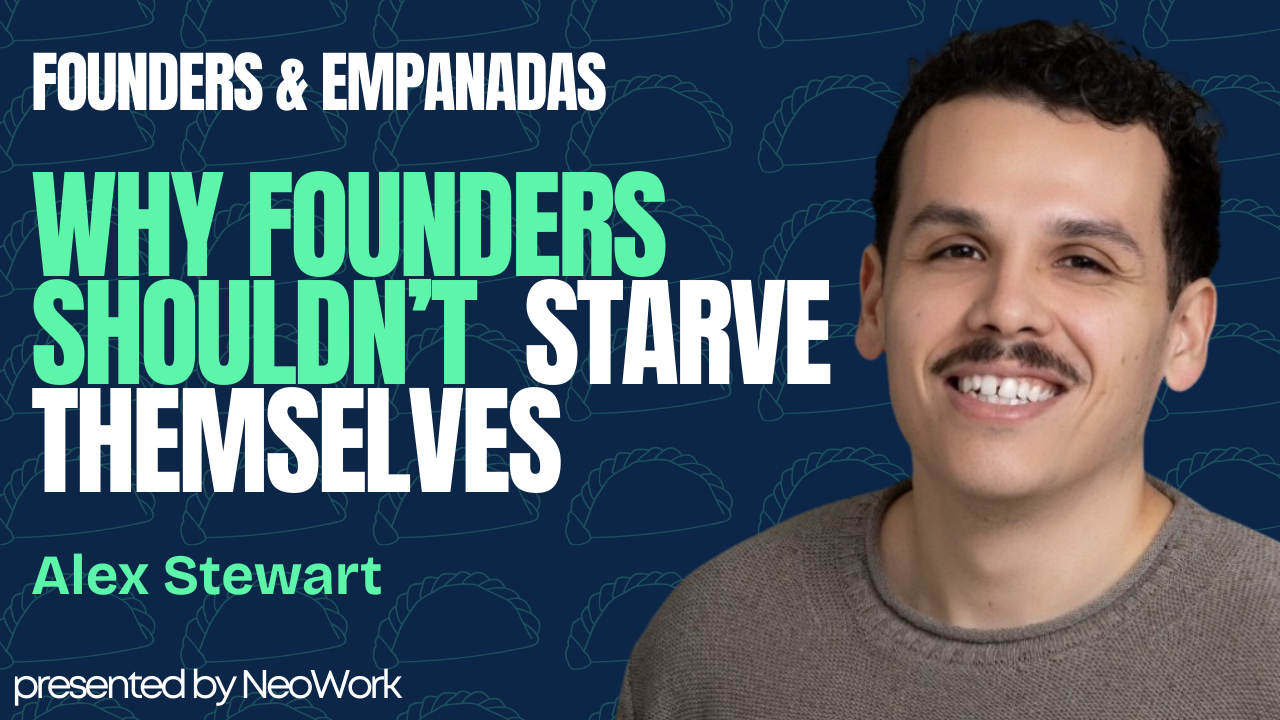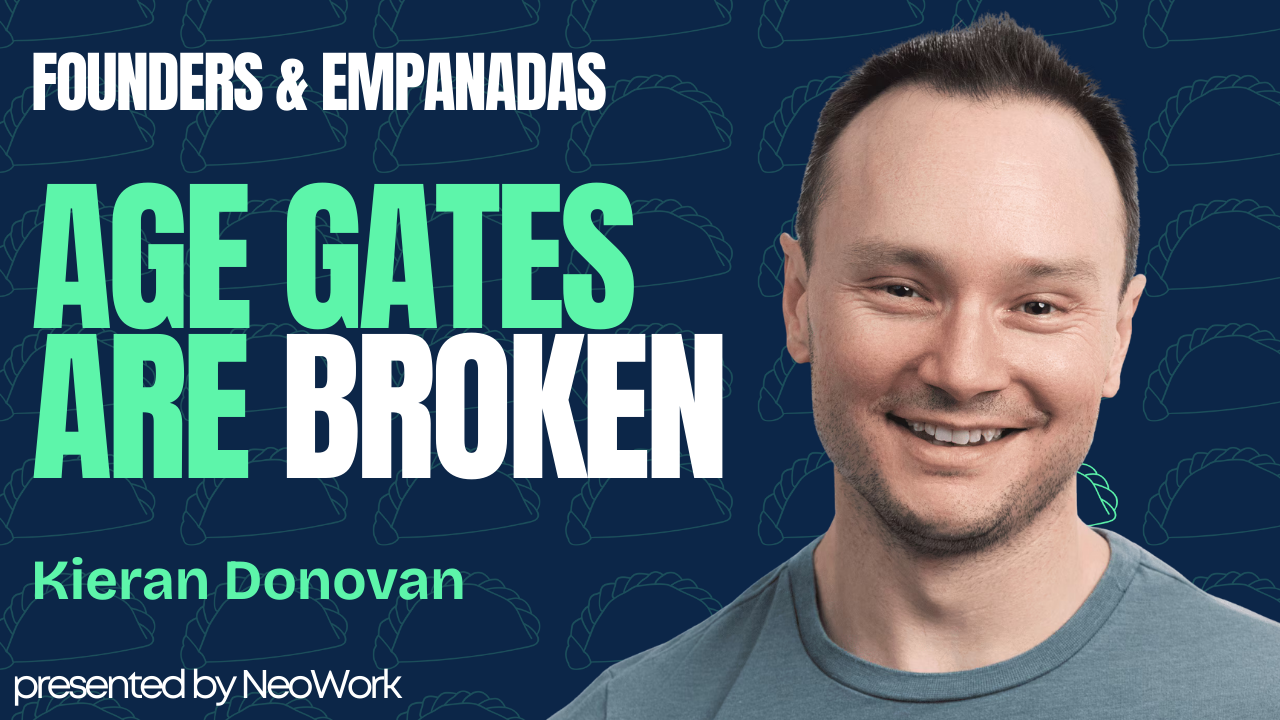.avif)
.png)
Starting as a writer, Rob Hoffman’s career took a turn when he jumped into sales at a startup, closing $500,000 in his first year and doubling that the next. This was the foundation for co-founding Contact Studios, where Rob serves as CEO and leverages his blend of content expertise and sales acumen to help marketers scale their content production without increasing headcount.
In this episode, Rob and I get into founder-led sales. We explore the emotional rollercoaster of balancing sales with other startup duties, the power of authenticity in closing deals, and the art of leveraging diverse skills in the sales process. Rob's insights on his current challenge – transitioning from being the primary salesperson to building a dedicated sales team – offer lessons for founders trying to scale themselves out of wearing all the hats.
Catch the full episode with Rob Hoffman here:
Below we will cover:
- The emotional toll of sales and the importance of self-care
- Mastering the art of question-based selling
- Harnessing authenticity and showmanship in sales calls
- Leveraging diverse skills, like writing, in the sales process
- Strategies for transitioning out of founder-led sales
Managing the Emotional Toll of Sales
Founders often find themselves wearing multiple hats, and one of the most demanding roles is sales. Rob doesn't sugarcoat the struggles that come with this territory:
Sales is so emotionally toxic. It's such an emotional labor… What I find is really helpful, especially cause sales is such a social thing, you really have to be turned on, put your best foot forward… so I think just creating space where you can kind of have time to yourself.
Balancing sales with everything else is no joke. Rob's onto something with the whole "me-time" thing. Find your escape valve – maybe it's a morning run, a midday meditation, or even a sneaky siesta. Whatever recharges your batteries. Because when you're running on fumes, you're just not going to be able to execute at your highest level.
The Art of Question-Based Selling
One of my favorite strategies Rob shared was his approach to sales calls, which he describes as question-based selling:
The best salespeople ask a lot of questions. So create a document where you have a little bit of a script for the opening that you're gonna give. You're not always gonna follow that every single time, but it at least just makes you feel more comfortable going into a call and knowing roughly what you're gonna say for the opening. After that, it's just a lot of asking questions. And that takes the pressure massively off of you because your job is pretty simple. You're just kind of sitting there. You're like a doctor diagnosing a patient by asking questions.
The key here is curiosity. Dive deep into your prospect's world. What keeps them up at night? What's their biggest headache? What’s their favorite color? (Could be relevant one day) Your product knowledge isn't for showing off – it's for asking the right questions. While you're playing Sherlock, you're also taking the pressure off yourself. No need for a perfect pitch when you're too busy listening. This helps ease that emotional toll we already touched on.
The Power of Authenticity in Sales
Prospects are drilled over the head constantly with polished sales pitches and rehearsed presentations, Rob emphasizes the importance of authenticity and enthusiasm:
I think showmanship is such an underappreciated quality. Even you just getting on a call with somebody and getting excited and being a bit charismatic and injecting some energy into the conversation, that goes a long way and you'd be surprised about how many people don't do that.
Your enthusiasm is contagious – use it. Don’t water it down trying to sound "professional." In the tug-of-war between polished and passionate, always bet on passion. So let that founder fire shine through. It's the best way to light up a prospect's interest.
Leveraging Diverse Skills in Sales
One of the advantages of founder-led sales is the ability to draw on a diverse skill set. Rob's background as a writer proved more valuable than he imagined in his sales efforts:
Being a writer is actually super advantageous in business and in sales for many reasons, but one area in particular is knowing how to do proper research. [...] Ideally what you want to do is put your investigative journalistic hat on before a sales call and try to figure out, what's the story behind this company?
Your past jobs are not irrelevant. Were you a teacher? Use those explanation skills. Former designer? Visualize solutions for clients. Rob's writing chops gave him an edge in research. My product background? It lets me speak the client's language. The point is, your seemingly irrelevant background is a treasure trove of skills. Tap into it.
Transitioning Out of Founder-Led Sales
All businesses come to a time when you need to consider transitioning away from being the primary sales driver. Rob shares a practical approach to this transition:
To transition yourself out of your role, really what you want to do is just document everything that you do. And the best way of doing that is through Loom videos, which is really, really simple. [...] If you make mistakes, screw it. It doesn't matter. You don't have to have the perfect clean cut training resource that has no like mistakes in it.
Stepping back from sales doesn't mean stepping away from your baby. It's about evolution. Document your process, warts and all. Going through this process will teach you more about your sales style than you ever knew. Embrace the messy, imperfect process. Your future sales team will thank you for the raw, real insights. And you? You'll be free to take the company to another level.
Topics
From Writer to $1M Closer: The Sales Tactics That Saved Rob Hoffman’s Career
Starting as a writer, Rob Hoffman’s career took a turn when he jumped into sales at a startup, closing $500,000 in his first year and doubling that the next. This was the foundation for co-founding Contact Studios, where Rob serves as CEO and leverages his blend of content expertise and sales acumen to help marketers scale their content production without increasing headcount.
In this episode, Rob and I get into founder-led sales. We explore the emotional rollercoaster of balancing sales with other startup duties, the power of authenticity in closing deals, and the art of leveraging diverse skills in the sales process. Rob's insights on his current challenge – transitioning from being the primary salesperson to building a dedicated sales team – offer lessons for founders trying to scale themselves out of wearing all the hats.
Catch the full episode with Rob Hoffman here:
Below we will cover:
- The emotional toll of sales and the importance of self-care
- Mastering the art of question-based selling
- Harnessing authenticity and showmanship in sales calls
- Leveraging diverse skills, like writing, in the sales process
- Strategies for transitioning out of founder-led sales
Managing the Emotional Toll of Sales
Founders often find themselves wearing multiple hats, and one of the most demanding roles is sales. Rob doesn't sugarcoat the struggles that come with this territory:
Sales is so emotionally toxic. It's such an emotional labor… What I find is really helpful, especially cause sales is such a social thing, you really have to be turned on, put your best foot forward… so I think just creating space where you can kind of have time to yourself.
Balancing sales with everything else is no joke. Rob's onto something with the whole "me-time" thing. Find your escape valve – maybe it's a morning run, a midday meditation, or even a sneaky siesta. Whatever recharges your batteries. Because when you're running on fumes, you're just not going to be able to execute at your highest level.
The Art of Question-Based Selling
One of my favorite strategies Rob shared was his approach to sales calls, which he describes as question-based selling:
The best salespeople ask a lot of questions. So create a document where you have a little bit of a script for the opening that you're gonna give. You're not always gonna follow that every single time, but it at least just makes you feel more comfortable going into a call and knowing roughly what you're gonna say for the opening. After that, it's just a lot of asking questions. And that takes the pressure massively off of you because your job is pretty simple. You're just kind of sitting there. You're like a doctor diagnosing a patient by asking questions.
The key here is curiosity. Dive deep into your prospect's world. What keeps them up at night? What's their biggest headache? What’s their favorite color? (Could be relevant one day) Your product knowledge isn't for showing off – it's for asking the right questions. While you're playing Sherlock, you're also taking the pressure off yourself. No need for a perfect pitch when you're too busy listening. This helps ease that emotional toll we already touched on.
The Power of Authenticity in Sales
Prospects are drilled over the head constantly with polished sales pitches and rehearsed presentations, Rob emphasizes the importance of authenticity and enthusiasm:
I think showmanship is such an underappreciated quality. Even you just getting on a call with somebody and getting excited and being a bit charismatic and injecting some energy into the conversation, that goes a long way and you'd be surprised about how many people don't do that.
Your enthusiasm is contagious – use it. Don’t water it down trying to sound "professional." In the tug-of-war between polished and passionate, always bet on passion. So let that founder fire shine through. It's the best way to light up a prospect's interest.
Leveraging Diverse Skills in Sales
One of the advantages of founder-led sales is the ability to draw on a diverse skill set. Rob's background as a writer proved more valuable than he imagined in his sales efforts:
Being a writer is actually super advantageous in business and in sales for many reasons, but one area in particular is knowing how to do proper research. [...] Ideally what you want to do is put your investigative journalistic hat on before a sales call and try to figure out, what's the story behind this company?
Your past jobs are not irrelevant. Were you a teacher? Use those explanation skills. Former designer? Visualize solutions for clients. Rob's writing chops gave him an edge in research. My product background? It lets me speak the client's language. The point is, your seemingly irrelevant background is a treasure trove of skills. Tap into it.
Transitioning Out of Founder-Led Sales
All businesses come to a time when you need to consider transitioning away from being the primary sales driver. Rob shares a practical approach to this transition:
To transition yourself out of your role, really what you want to do is just document everything that you do. And the best way of doing that is through Loom videos, which is really, really simple. [...] If you make mistakes, screw it. It doesn't matter. You don't have to have the perfect clean cut training resource that has no like mistakes in it.
Stepping back from sales doesn't mean stepping away from your baby. It's about evolution. Document your process, warts and all. Going through this process will teach you more about your sales style than you ever knew. Embrace the messy, imperfect process. Your future sales team will thank you for the raw, real insights. And you? You'll be free to take the company to another level.
Topics
Related Blogs
Related Podcasts














